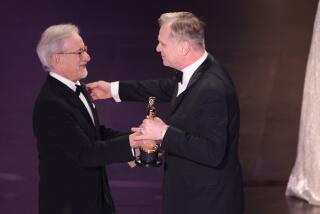Review: Oscar-nominated shorts are long on fear, joy and imagination
Whether live action, documentary or animated, Oscar-nominated shorts typically span a fascinating range of aesthetics and sensibilities, and this year is no exception.
Overseas conflicts dominate the live-action category this year. In the well-meaning if melodramatic “Day One,” a new Afghan American U.S. Army interpreter deals with fear, confusion and hope in a remote village where a suspected bomb maker lives. The Balkans war is the backdrop for the grimly affecting “Shok,” in which an abandoned bicycle sparks an Albanian man’s scarring memory of a childhood friendship. “Ave Maria” satirizes the “noise” of an age-old clash in a problem-solving comedy about a bickering Israeli family whose car is stranded outside the convent of a silent order of Palestinian nuns.
Oscars 2016: Full Coverage | Complete list
The decisions of desperate men play out in both “Stutterer,” a tersely elegant charmer about a speech-afflicted man’s impending first meeting in person with a female text-message pal, and Patrick Vollrath’s unnerving, superbly acted domestic nailbiter “Alles Wird Gut (Everything Will Be Okay),” the standout in this cluster. Built around the increasingly off-kilter feeling an 8-year-old girl gets from her divorced dad on their day out, it’s a tense, emotional marvel.
Trauma and aftermath are the overriding concerns of the documentary selections. The swirling, immersive “Body Team 12” is the most visceral example of that, following Liberian Red Cross workers as they enter grief-wracked communities to retrieve Ebola victims. Empowerment versus tradition marks the alternately sobering and enraging “A Girl in the River: The Price of Forgiveness,” about an 18-year-old Pakistani daughter who survives an attempted honor killing, only to be pressured by her community’s male elders to forgive the father and uncle who shot her in the head. The brisk portrait “Chau, Beyond the Lines” introduces an Agent Orange-stricken teenager in Vietnam fighting disability and discouragement in his efforts to live independently and follow his passion to be an artist.
The stubborn Frenchman who spent 12 psychologically grueling years in the ‘70s and ‘80s interviewing survivors and perpetrators for “Shoah” — cinema’s towering achievement in documenting the Holocaust — is the subject of the straightforward “Claude Lanzmann: Spectres of the Shoah.” The closest to a work of art itself is “Last Day of Freedom,” which uses rotoscoped animation to enrich a heartbroken man’s personal narrative about his post traumatic stress disorder-suffering Vietnam vet brother, the crime he committed, and the decision that sealed his brother’s fate. Tinged with a loved one’s regret, haunted by the societal forces of neglect and misunderstanding, it’s a quietly devastating work from first-time filmmakers Dee Hibbert-Jones and Nomi Talisman.
See more of Entertainment’s top stories on Facebook >>
This year the richest category is animation, where a variety of styles evoke potent stories of childlike wonder and mournful memory.
Pixar’s wordless dazzler “Sanjay’s Super Team” conjures a healing generational bond when a superhero-loving Indian American boy sees the Hindu gods of his father’s religion in a new, thrilling light. Similarly talk-free, the Russian nominee “We Can’t Live Without Cosmos” — about close-knit cosmonauts in training — tells a wonderfully humane, and inevitably touching story of teamwork and sacrifice in pursuit of a dream. It’s a small gem of character-centric animation.
Celebrated stick-figure iconoclast Don Hertzfeldt returns with another wry, minimalist masterpiece. “World of Tomorrow” is a cosmic dialogue between a bubbly little girl — all innocent questions and joyful observations — and her cloned, antiseptically melancholy adult self. A visionary tour of immortality-obsessed humanity’s possible future, it tickles and saddens equally.
The shadow of war touches even this category. The Chilean “Historia de un Oso (Bear Story)” an allegory of Augusto Pinochet’s destructive rule, features an old bear who makes mechanized dioramas that tell the story of how the circus separated him from his family. The six-minute “Prologue,” meanwhile, another dialogue-less entry, pits a handful of ancient warriors against each other in violent battle while a little girl watches in horror. Entirely hand-drawn by Oscar-winning grandmaster Richard Williams (“Who Framed Roger Rabbit”), and inspired by Aristophanes’ “Lysistrata” — as was Spike Lee’s “Chi-Raq” — it’s a breathtaking example of artistic vision and timeless, painstaking craft. Like the best of these animated shorts, its brevity bursts with imagination.
------------
‘2016 Oscar-Nominated Short Films: Documentary’
No MPAA rating.
Running times: 2 hours, 39 minutes
Playing: Laemmle Monica, Santa Monica and Regency South Coast Village 3
‘2016 Oscar-Nominated Short Films: Animated’
No MPAA rating. “Prologue,” the final film in the program, contains violence and some male nudity.
Running times: 1 hour, 26 minutes
Playing: Landmark Nuart, West Los Angeles and Regency South Coast Village 3, Santa Ana
‘2016 Oscar-Nominated Short Films: Live Action’
No MPAA rating.
Running times: 1 hour, 47 minutes
Playing: Landmark Nuart, West Los Angeles and Regency South Coast Village 3, Santa Ana
More to Read
Only good movies
Get the Indie Focus newsletter, Mark Olsen's weekly guide to the world of cinema.
You may occasionally receive promotional content from the Los Angeles Times.








